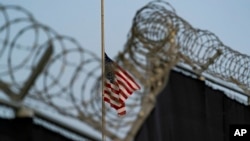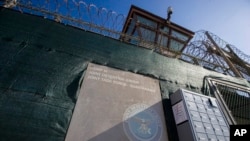With nearly constant surveillance, grueling isolation and limited family access, the treatment of the last 30 Guantanamo detainees is "cruel, inhuman and degrading," U.N. rights experts said Monday as they reported on their first visit to the U.S. military prison.
U.N. Special Rapporteur Fionnuala Ni Aolain said mistreatment at the prison on an American naval base in Guantanamo Bay, Cuba, amounted to violations of detainees' fundamental rights and freedoms.
The detainees, held close to two decades after being seized as suspects following the 2001 al-Qaida attack on the United States, have endured a litany of abuse, including forced cell extractions, poor medical and mental health care, said Ni Aolain.
The detainees also have had inadequate access to family either by in-person visits or calls, she said in a news briefing.
"The totality of all of these practices and omissions ... amounts in my assessment to ongoing cruel, inhuman and degrading treatment under international law," she said.
Ni Aolain, the U.N. special rapporteur on the Promotion and Protection of Human Rights and Fundamental Freedoms while Countering Terrorism, traveled to Guantanamo with a team in February after U.N. rights experts had sought to visit the prison for two decades.
Introducing the team's report, she said Washington had yet to address the most glaring rights violation related to the detainees: their secret seizure and transfer — or rendition — to Guantanamo in the early 2000s, and, for many, enduring extensive torture by U.S. operatives in the first years after the September 11 attacks.
Their planned military trials have been stalled for years over the question of whether they can receive fair justice if they have been tortured.
That is unfair to the victims of the September 11 attack as well, said Ni Aolain.
"The systematic rendition and torture at multiple (including black) sites and thereafter at Guantanamo Bay, Cuba ... comprise the single most significant barrier to fulfilling victims' rights to justice and accountability," the U.N. special rapporteur said.
Nevertheless, she welcomed the administration of President Joe Biden's openness for allowing her team to visit Guantanamo and examine the treatment of the detainees, who once numbered nearly 800.
"Few states exhibit that kind of courage," she said.
Nevertheless, she said, closure of the prison, which remains outside the U.S. justice system, "remains a priority."
In addition, "the U.S. government must ensure accountability for all violations of international law, both for victims of its counterterrorism practices, present and former detainees, and victims of terrorism," she said.
Accountability, she said, includes apologies, full remedy and reparations for "all victims," she said.
In a letter to Ni Aolain on the report, Michele Taylor, the U.S. envoy to the U.N. Human Rights Council in Geneva, said the U.S. does not accept all her assessments.
"We are committed to providing safe and humane treatment for detainees," Taylor wrote.





